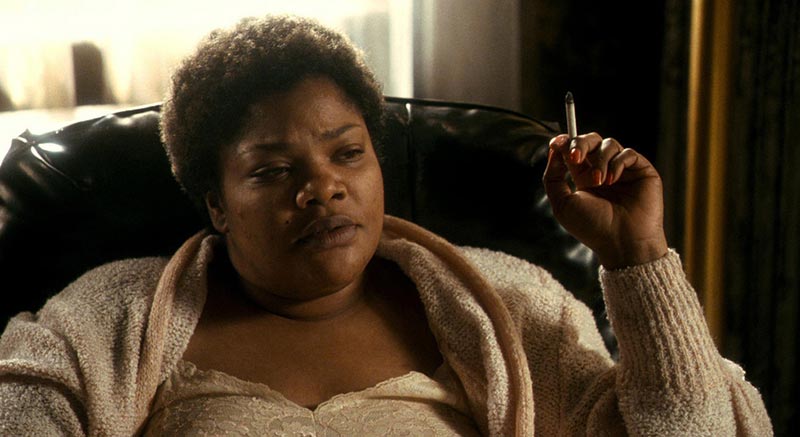With the approach of the Academy Awards ceremony on March 7th, I’ve decided to take a look at films nominated in the Best Picture category. Watching a whole batch of commercial American films is a bit like locking yourself overnight in a candy factory. After a while, your palate begins to long for a more subtle experience. That’s especially true this year when the nominations include over-the-top animations (Up, Avatar) and over-the-top war flicks (Inglorious Basterds, The Hurt Locker) and George Clooney.
Rather than review the films, I thought I’d review the reviewers (or at least those reviewers who dis the Oscar nominees) and ask if their negative view of things is justified. Let’s begin with one of the year’s stronger showings—Precious, directed by Lee Daniels, with Gabourey Sidibe in the title role.
Precious gives us a glimpse of an overweight pregnant illiterate black teen growing up in Harlem. She lives with a narcissistic sociopath of a mother who verbally and physically abuses her. In effect, the mother uses her as a personal slave and exploits her for the welfare check. She is sexually abused by a father we never see except as fleeting recollections of a man grunting on top of her. The father is the father of both her children and, as a bonus, has infected her with HIV. Her welfare caseworker wants her to work which would allow her to keep her children but trap her in poverty. Her teacher wants her to give up her children and focus on her education. Precious sees the either/or for what it is—a false choice—and chooses both instead. The film is worth seeing if for no other reason than to witness Mo’Nique’s performance as the abusive mother. I will be surprised if she doesn’t win Best Supporting Actress.

Now for the negative review which disses Precious. This comes from from David Cox in the Guardian: Precious is an insult to the poor. According to Cox, the audience is “invited to indulge prejudices of which they might otherwise feel ashamed. Their worst fears about the welfare-dependent underclass are confirmed and legitimised ….” The problem, he says, is that the film fails to show that she’s the victim “of social and economic conditions, even partially, but solely of the behaviour of her kind.” Even the escapist, almost dissociative, fantasies she entertains after beatings is dissed as visions of “tacky celebrity.” Cox concludes by calling it a “pernicious film.”
Given my bias against the Hollywood film industry and my natural suspicion of any cultural work in which Oprah has a hand, I would love to agree with Cox—except that he’s wrong. Cox’s error can be boiled down to this: he fails to make a distinction between the views presented by characters within the film and the view presented by the film itself. The fact that the teacher wants Precious to give up her children for adoption does not constitute a recommendation by the filmmakers. In fact, Precious rejects her teacher’s view of things. The fact that Precious entertains shallow fantasies of “tacky celebrity” does not mean she is therefore shallow. What it means is that her imagination is narrowly circumscribed by her poverty. Maybe Cox was in the bathroom during the scene when the mother threw the TV set down the stairwell in an attempt to kill her daughter. Or maybe Cox’s own poverty of imagination made it impossible for him to recognize the symbolic power of that act. And the fact that Precious is victimized by “her kind” does not automatically mean the film is slamming the door on a nuanced account of urban poverty. While Cox complains that the father’s near-absence from the film reduces him to caricature, I would suggest that Lee Daniels is using absence to good effect. Caricature happens when a character is present, but two-dimensional. But by removing him into the shadows and half-light, we have no choice but to project our own fears onto his absence. Hitchcock taught us long ago the power of such absence.
If Cox wanted a nuanced multi-dimensional exploration of poverty’s causes, he should have watched a PBS documentary. It’s disingenuous of a critic to fault the filmmaker for failing to make the film he would rather have watched. Cox wanted to see a film about an escape from poverty, and that’s the film he critiqued. Unfortunately for him, Precious isn’t about poverty. While poverty figures in the story, Precious is about a daughter’s relationship with a crazy-assed mother (which probably explains why the film has enjoyed a much wider appeal than anticipated). Although poverty forms a backdrop for the story, poverty is better understood as a symbol of the spiritual and emotional poverty within the dysfunctional relationship which lies at the heart of the story, much as the stormy heath reflects the interior storm of Lear’s spirit in a more famous story of a daughter and a crazy-assed parent. By the end of the film, what we witness is not an escape from poverty but an escape from an emotionally stultifying relationship.
See the film. It’s a good film. Ignore David Cox. He’s not a good critic.